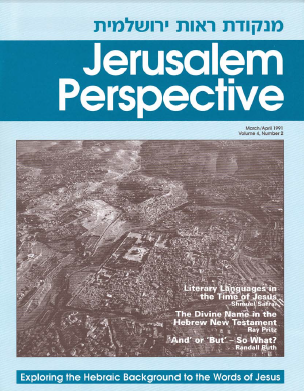Question received from E. V. May, Jr. (Livingston, Texas, U.S.A.) that was published in the “Readers’ Perspective” column of Jerusalem Perspective 31 (March-April 1991): 12.
Strong’s Analytical Concordance shows that the word “Christ” appears 570 times in the New Testament. Why can’t this transliterated word be given its translated form, “Messiah,” in our Bibles instead of the transliteration? Since most English-speaking people are not thinkers in Greek, wouldn’t it help to better communicate Jesus’ role and mission with the use of “Messiah?” What is read is what is said, what is said is what is thought, what is thought is what is emphasized. In order to change the emphasis, the word that is written needs to be changed from “Christ” to “Messiah.”
David Bivin responds:
I wholly agree with you. Partly because I live in Israel in a Hebrew-speaking environment, I find the use of “Christ” somewhat irritating, especially when it is used as if it were a proper name: “Jesus Christ.” I think “Messiah” more accurately conveys in English what the Greek authors of the New Testament meant to convey with the Greek “christos.” See my article, “Messiah” (Jerusalem Perspective 26 [May/June 1990]: 6). See also my “Messianic Claims” (Jerusalem Perspective 27 [July/August 1990]: 11), where I wrote: “Many Christians seem to think that ‘Christ’ was Jesus’ surname, while non-Christians often use it as a swear word. ‘Christ’ is an English transliteration of a Greek translation of an original Hebrew word—a good example of the influence of Greek language and culture on our culture. It also is an example of the Church’s loss of its Hebraic and Jewish roots.”





Comments 2
The trouble with rendering χριστός (christos, “anointed”) as “Messiah” is that it simply replaces one transliteration (Christ) with another transliteration, Messiah, which is simply the English form of the Hebrew word מָשִׁיחַ (māshiaḥ, “anointed”). Both “Christ” and “Messiah” are foreign terms that have no inherent meaning in the English language.
Nevertheless, the two terms do carry a lot of theological and historical baggage. Early in its history Christianity became predominantly Greek-speaking, and so the Greek term christos was applied to Jesus. Originally it was used to convey a message about Jesus to fellow Jews and to God-fearing Gentiles who spoke Greek, telling them that Jesus was the anointed redeemer for whom they had been waiting. Judaism, on the other hand, became less Greek-speaking and more Hebrew- and Aramaic-speaking in orientation, and so “Messiah” became the preferred term for Israel’s eschatological redeemer figure. Over the centuries “Christ” came to refer less and less to the Jewish concept of a redeemer of Israel and more and more to the Christian concept of the savior, until now “Christ” and “Messiah” are no longer synonymous.
Because of its baggage “Christ” may not be the most useful term for speaking about Jesus, but “Messiah” has also acquired baggage, some of which it was already carrying in the Second Temple period. Many Jews imagined the Messiah would be a warrior king like David who would redeem Israel by killing its enemies. Jesus’ concept of what the anointed redeemer would be was quite different, and it may be for that very reason that Jesus did not often use the term “Messiah” in his teaching. Perhaps the best translation of christos in the New Testament would be “divinely appointed redeemer.” Such a phrase would capture the essence of what the early believers meant when they used the words christos and māshiaḥ when communicating to their first-century audiences.
I so agree about the use of the word Christ. I’m a Jewish believer in Yeshua, and I have a really difficult time swallowing the word Christ. Every time I see Christ in Scripture, I have to translate to Messiah so my Jewish heart can receive it. I find it so hurtful that the translators of the Bible used Christ instead of Messiah. I agree: using Christ, instead of Messiah, negates the Jewish roots of the Christian faith.